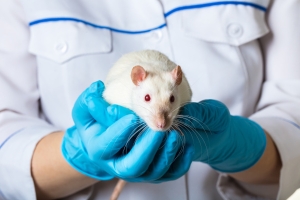Should NH prohibit the sale of cosmetic products tested on animals?

In 2018, California passed the Cruelty-Free Cosmetics Act, which banned the sale of animal-tested cosmetics. Since then, eight other states have followed suit, including Maine, as well as 41 foreign countries. Now, New Hampshire is considering SB 202, a bill that would ban cosmetics manufacturers who employ animal testing from selling their products in the Granite State.
Animal testing and cosmetics
The word “cosmetics” encompasses a wide range of products applied to a person’s body to promote beauty and/or cleanliness. This can include perfumes, moisturizers, make up, hair products, and more. While the Food and Drug Administration does not specifically require cosmetics manufacturers to test their products on animals, companies sometimes choose to do so to substantiate the safety of a product or ingredient.
Animals commonly used in such testing include rabbits, mice, guinea pigs, and rats. Tests may involve dripping ingredients into the eyes of restrained animals to determine the level of irritation the chemical causes, force feeding the ingredient to the animal to see if ingesting the ingredient causes illness, and even “lethal dose” tests to determine how much of the ingredient it would take to cause death. Animals are sometimes killed after tests are completed.
About SB 202
SB 202 states that no manufacturer may sell cosmetics that were made using animal testing performed after January 1, 2023. In other words, this would not impact makeup that was developed using animal testing decades prior; it would simply stop companies who continue to test on animals from selling products here. The word “cosmetics” in this case applies to beauty and cleansing products that are applied to the body; however, the law would explicitly not apply to soap.
There are also some exceptions written into the bill. For example, if there is no non-animal alternative method available, there may be limited instances where animal tested products could still be allowed if there were specific human health concerns. The Senate Commerce committee also added language to hold New Hampshire cosmetics retailers legally harmless; it would be manufacturers who could be charged with a violation under the proposed law, not retailers or consumers.
If a manufacturer violates this law, they could be fined up to $5,000 for the first day of the violation, and receive an additional fine of $1,000 for each day they continue to sell the animal-tested product.
Pros and cons
At the Senate Commerce Committee hearing for this bill, Sen. David Watters (who is sponsoring the bill) and a representative of the Humane Society of the United States spoke in favor of the legislation. They argued that animal testing is not only cruel, it is often an unreliable predictor of human biological responses. Plus, modern technology has made it possible to more accurately determine the safety of cosmetic products without the use of animals; this includes human cell-based tests and sophisticated computer models.
Also, there are already thousands of cosmetic ingredients that are already known to be safe. Manufacturers can opt to use these ingredients without needing to test them on animals.
While no one spoke in opposition to the bill at the Senate hearing, there are still reasons one might oppose the legislation. For one, some might argue that consumers are already making it clear that cruelty-free products are more desirable, and that therefore the state does not need to impose red tape on companies.
There is also a bill at the federal level to ban animal testing, the Humane Cosmetics Act. Some state legislators may prefer to wait for federal action to ban animal testing, rather than create a patchwork of different legislation in different states.
How can I get involved?
SB 202 was given a thumbs up in the Senate and is now being considered by the House Commerce and Consumer Affairs Committee. If you’d like to make your voice heard on this bill, you will have an opportunity to testify at the public hearing on April 13. You can also reach out to your representatives and express your opinion. To get started, visit our Elected Officials page to learn who represents you in the Legislature.
Update: SB 202 did not pass the House. Click here to explore the latest legislative proposals related to animal rights.











Comments
Login or register to post comments